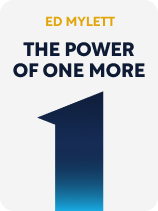

This article is an excerpt from the Shortform book guide to "The Power of One More" by Ed Mylett. Shortform has the world's best summaries and analyses of books you should be reading.
Like this article? Sign up for a free trial here.
What if you could attract more opportunities simply by changing your focus? How can shifting your perception of time help you achieve more in life?
In The Power of One More, Ed Mylett’s strategies for consciously shaping reality offer practical ways to create an extraordinary life. His approach combines the power of focused attention with innovative time management techniques to help you manifest your goals.
Keep reading to discover how to shape your reality by leveraging your brain’s natural filtering system and transforming your relationship with time.
Shape Your Reality
Mylett writes that you can consciously shape your reality to support an extra-mile lifestyle. By directing your focus and changing your perception of time, you can attract more opportunities and resources. Let’s explore these two strategies further.
Direct Your Focus
One way to shape your reality is to be more intentional about what you focus on. Mylett writes that you can attract more opportunities and resources by focusing more on your goals every day. He explains that your brain has a network of nerve cells called a reticular activating system (RAS) that acts as a filter for information. It helps you notice things that are important to you and filters out less relevant information. This increased awareness of your priorities can help you take advantage of resources and chances you might have otherwise missed, allowing you to actively shape your reality in line with your goals.
Mylett suggests you harness your RAS by vividly imagining a specific goal and replaying that mental movie until it’s embedded in your subconscious. For instance, if your goal is to be a professional painter, you might picture yourself in a sunlit studio, surrounded by your completed artworks, with galleries calling to book your next show. By replaying this scene in your mind daily, you may suddenly notice art supply sales you previously overlooked, overhear conversations about upcoming gallery openings, and meet other painters.
Leverage Your Time Perception
Mylett writes that you can also change your reality by stretching how you perceive time. While you can’t literally slow time down, you can alter how quickly or slowly time seems to pass and improve how productive you are as a result.
Your perception of time depends on various factors like your age, experiences, and energy levels, but Mylett suggests several ways you can make time feel more abundant.
1. Make a plan. Spend the first 30 minutes of your day assessing your priorities. This helps you focus on doing tasks that matter most for your goals instead of just reacting to whatever comes up during the day.
2. Divide your day into “mini days.” We all have only 24 hours in a day, but by breaking this time into three smaller “days” or timeframes such as noon to 6 p.m., you can essentially squeeze three days’ worth of productivity from 24 hours. These compressed “days” make each minute feel more valuable, which motivates you to accomplish more tasks in less time.
3. Create a sense of urgency. Treat every task as if it’s urgent. Mylett points out that the amount of time you have to complete a task affects how productive you are and how quickly you complete it. If you have a work project due in three months, you’ll likely procrastinate until the deadline looms. To avoid this trap, pretend that the deadline is closer to get more done.
4. Reflect. Track your progress toward your goals weekly, daily, or even hourly. The more often you evaluate how you’re doing, the better you can course-correct and use your time more efficiently.

———End of Preview———
Like what you just read? Read the rest of the world's best book summary and analysis of Ed Mylett's "The Power of One More" at Shortform.
Here's what you'll find in our full The Power of One More summary:
- The power of an extra-mile mindset and how to adopt one
- Tips for building an inner circle of people who support your goals
- How to develop a tolerance for doing hard things






